10 Best Software Outsourcing Companies in Vietnam 2026
Building a high-quality in-house software team often requires significant time, cost, and operational resources, especially for mid-sized companies and large enterprises. As a result, software outsourcing has become a strategic choice, and Vietnam has emerged as one of the most attractive global destinations for these services.
According to Titan Corp, Vietnam’s IT outsourcing market is projected to grow from $0.7 billion in 2024 to $1.28 billion by 2028, achieving a compound annual growth rate of approximately 17%. This growth is fueled by government-backed digital transformation initiatives and strong global demand for scalable development teams. Notably, BeeTechSoft reports that developer hourly rates in Vietnam typically range from $15 to $50, enabling businesses, especially startups and SMBs, to achieve substantial cost savings compared to markets like the United States or India.
However, competitive pricing alone does not guarantee the right choice. With a wide range of vendors varying in expertise, scale, and delivery standards, businesses often struggle to identify a partner that truly understands their vision and can deliver high-quality products on time. Therefore, selecting an outsourcing provider based on transparent criteria and verified industry insights is essential to minimize risks and ensure long-term success.
That’s why this expert guide from Groove Technology offers a structured, step-by-step approach to help you make informed outsourcing decisions in Vietnam. We explore the key advantages of Vietnam’s tech ecosystem and present the Top 10 most reliable software outsourcing companies, with Groove Technology standing out as a trusted partner. Choosing the right outsourcing company in Vietnam not only improves operational efficiency but also lays a solid foundation for scalable and sustainable business growth.
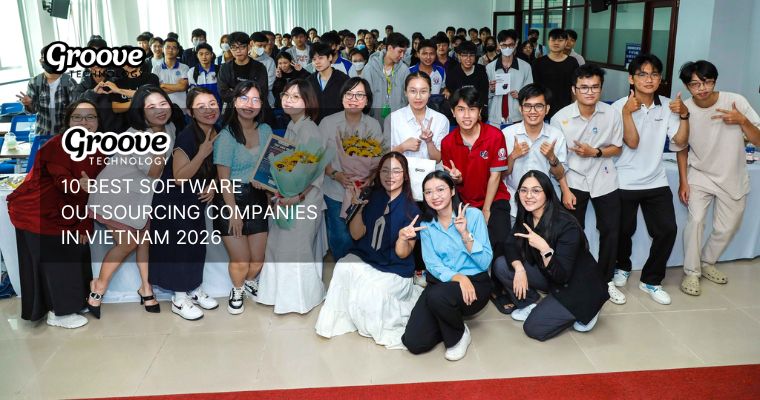
Why Choose Vietnam for Software Development Outsourcing?
Vietnam’s rise as a software outsourcing destination is no coincidence. The country offers a unique blend of cost-effectiveness, technical prowess, and a favorable business environment, making it an attractive option for companies from Australia, Europe, and the UK.
Once considered a secondary player in Asia, Dirox reports that Vietnam is now firmly positioned among the top 7 global software outsourcing destinations and holds the third spot in Southeast Asia, surpassing several regional competitors in terms of growth, scalability, and service quality.
This recognition stems from several key factors:
- Significant market growth: According to Statista, Vietnam’s outsourcing market is projected to reach a value of nearly US$698 million this year. With an annual growth rate of 16.38 per cent, the country could generate $880 million from outsourcing by 2028.
- Abundant skilled workforce: As of late 2024, Vietnam Law Magazine notes that nearly 26 million workers are employed in the Information and Communication Technology (ICT) sector.
- Strong academic foundation: The country has more than 300 universities and educational centers specializing in IT, such as HUST and FPT University. Furthermore, VnEconomy highlights that 80,000 students are expected to graduate in ICT each year, with at least 10% earning advanced degrees.
- Thriving business environment: Vietnam Law Magazine also reports that as of late 2024, Vietnam had 73,788 digital technology enterprises, marking a 10.1 percent increase from the previous year.
- Competitive cost structure: Vietnam offers significant cost savings compared to many Western countries, with software development rates often 50-70% lower, allowing businesses to optimize their R&D budgets effectively.
For businesses in Australia, Europe, and the UK, Vietnam’s offshore model offers several advantages:
- Time zone compatibility: Vietnam’s time zone (GMT+7) allows for significant overlap with Australian business hours and partial overlap with European time zones, facilitating real-time communication.
- English proficiency: English is widely taught in Vietnam, and many IT professionals possess strong language skills. The EF English Proficiency Index ranks Vietnam 60th out of 111 countries.
- Long-term partnership potential: Many Vietnamese outsourcing companies focus on building lasting relationships, which can lead to more stable and productive collaborations over time.
Top 10 Best Software Development Outsourcing Companies in Vietnam
Verified client reviews provide the most reliable way to gauge the quality and reliability of a potential tech partner. This list prioritizes these top-rated firms based on their Clutch scores and market reputation to help you start your search.
| Company | Clutch Rating |
| Groove Technology | 5.0/5.0 |
| Rikkeisoft | 5.0/5.0 |
| Designveloper | 4.9/5.0 |
| KMS Technology | 4.8/5.0 |
| Savvycom | 4.8/5.0 |
| Saigon Technology | 4.8/5.0 |
| NashTech | 4.7/5.0 |
| TMA Solutions | 4.0/5.0 |
| FPT Software | No rating yet |
| CMC Global | No rating yet |
The next section breaks down the specific expertise and service offerings of each listed company so you can identify the perfect match. Readers should continue reading to discover which team possesses the right skills to handle your upcoming software project.
Groove Technology
Groove Technology started in 2016 as an Australian software outsourcing company and operates primarily in Vietnam to offer a unique blend of Eastern efficiency and Western business practices. The company has delivered over 120 projects during 9 years of operation and maintains an impressive 97% client retention rate because they prioritize clear communication.
You can trust their security and quality standards since Groove holds ISO 9001 and ISO 27001 certifications and won the title of Vietnam’s Best B2B Partner 2022 by Clutch. Their team provides flexible resource solutions like staff augmentation or dedicated teams so you can scale your engineering capabilities efficiently.
Key software development outsourcing services from Groove Technology:
- Custom Software Development
- Web App Development
- Mobile App Development
- Ecommerce Development
- Progressive Web Apps (PWAs)
- AI and Machine Learning
- Internet of Things (IoT)
- AI Solutions Outsourcing
- AI Agent Solutions
- AI Data Analytics Solution
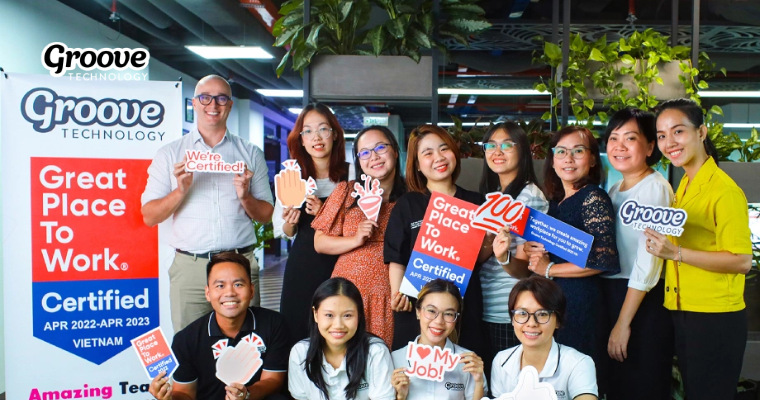
Rikkeisoft
Rikkeisoft was established in 2012 and has grown into a leading technology provider for the US, Europe, and APAC regions. The team has spent over 12 years helping partners modernize processes and accelerate digital transformation so you can achieve lasting results.
The company employs more than 2,000 people and has completed over 1,000 successful projects for 500 global clients. Rikkeisoft holds the position of the top private tech company in Vietnam and offers comprehensive support for modernizing your business.
Key software development outsourcing services from Rikkeisoft:
- Digital transformation consulting
- Mobile development
- Software and system development
- Software maintenance & upgrade
- Software testing
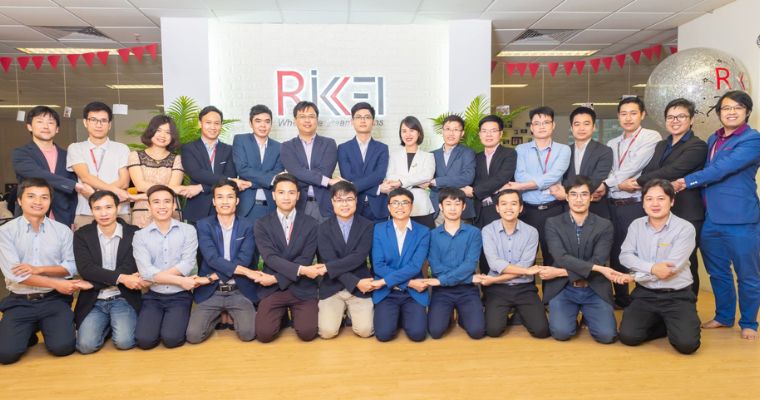
Designveloper
Designveloper is a leading software development company in Ho Chi Minh City and started in early 2013 with a team of enthusiastic experts. The company has dedicated over 550,000 hours of work across 12 years to serve 60 happy clients so you can trust their systematic approach. Their professionals include web developers, mobile developers, and UI/UX designers who intend to deliver the most cost-effective software services for your business.
Key software development outsourcing services from Designveloper:
- Web App Development
- Mobile App Development
- UI vs UX Design
- Custom Software Development
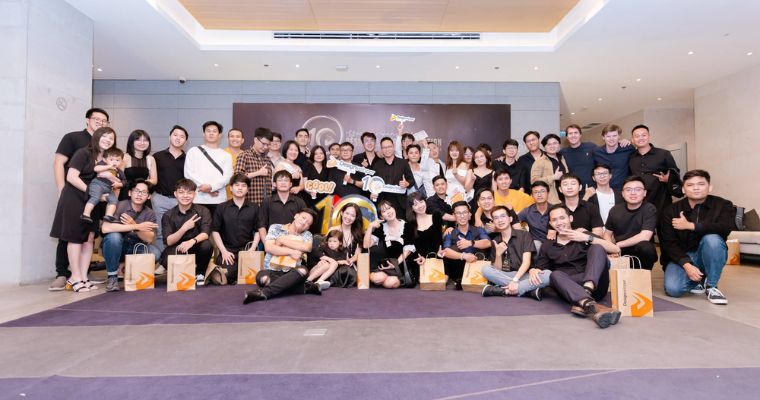
KMS Technology
KMS Technology established its operations in 2009 and currently maintains 5 offices across Vietnam, Mexico, and the United States to serve global clients. The company employs over 1,100 engineers who focus 100% on product engineering because they aim to help you turn bold ideas into high-impact software faster.
KMS Technology embeds AI across every engagement and brings 16 years of experience to support ISVs and digital health leaders. The team prioritizes long-term success, so they have maintained repeat customer relationships for over 10 years.
Key software development outsourcing services from KMS Technology:
- Application Modernization
- Artificial Intelligence
- Cloud & DevOps
- Product Engineering
- Quality Engineering & Test Automation
- Systems & Integration
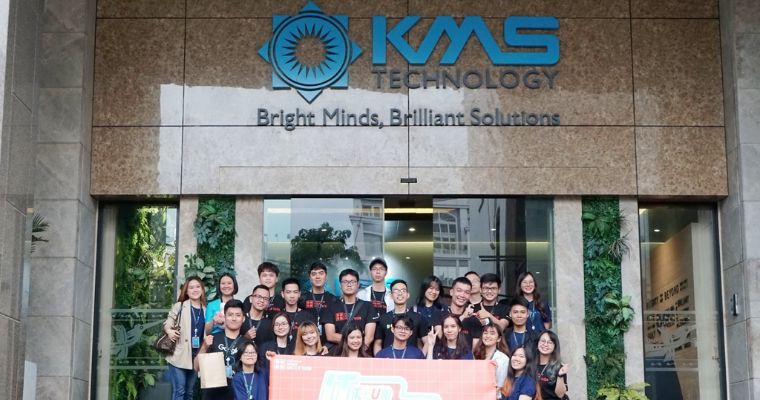
Savvycom
Savvycom was founded in 2009 and currently ranks as one of the top 10 software development companies in Vietnam because they empower startups and enterprises with high-quality solutions. The company maintains 7 global offices and has served over 100 enterprise clients across 30 different countries during its 16 years of operation.
Their team provides tailored digital transformation consulting and dedicated development groups so you can scale your business regardless of your industry or region. You gain access to a partner that understands the needs of both SMEs and large corporations.
Key software development outsourcing services from Savvycom:
- Global Delivery Center Service
- Development Team
- App Development
- Custom Software Development
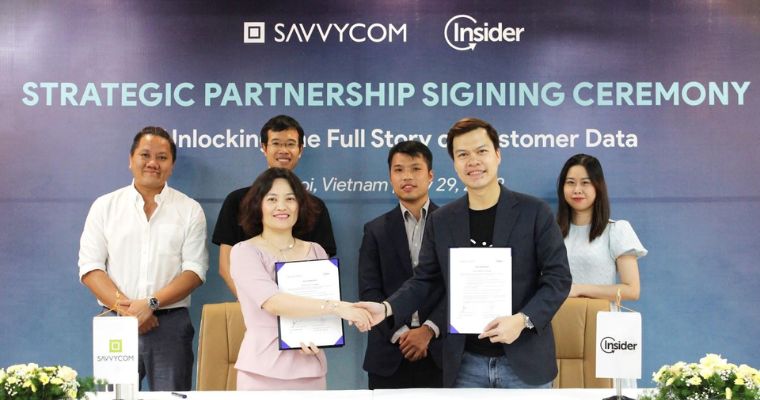
Saigon Technology
Saigon Technology was established in 2012 and acts as a leading force in Agile software development outsourcing in Vietnam. The company employs over 400 software developers who have successfully delivered more than 800 projects to clients across Europe, Australia, and North America. You can rely on their mature development process because they hold ISO 27001 certification and prioritize seamless communication. Their team specializes in providing professional offshore services so you benefit from their 14 years of experience in the industry.
Key software development outsourcing services from Saigon Technology:
- Custom Software Development
- Web Application Development
- Mobile App Development
- AI Development Services
- Generative AI Integration Services
- Software Product Development
- SaaS Application Development
- Software Integration Services
- MVP Software Development
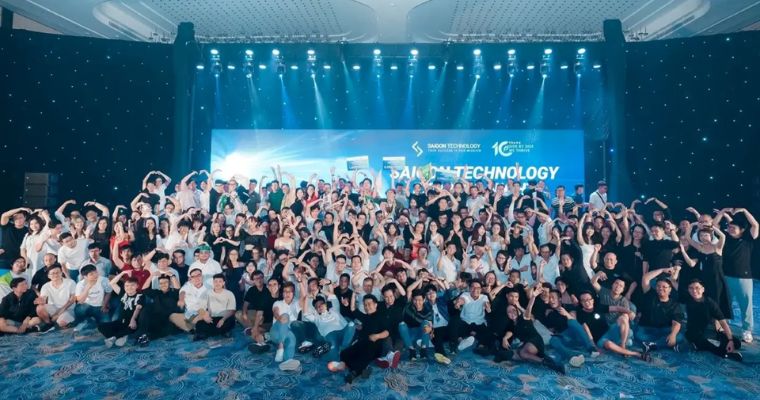
NashTech
NashTech operates as part of the Nash Squared group and brings over 25 years of experience to the market. The company maintains 11 global offices and 5 delivery centers with more than 2,000 skilled engineers who handle complex projects. 400+ clients have trusted this team over the last 10 years because they prioritize long-term success. You can expect a stable collaboration since their median client partnership lasts 5 years. NashTech achieved an outstanding client NPS of 76 in 2024 so their quality is verified by current customers.
Key software development outsourcing services from NashTech:
- Application assessment and transformation
- Application maintenance and support
- Quality assurance
- Quality digital transformation
- Quality engineering
- Intelligence testing automation
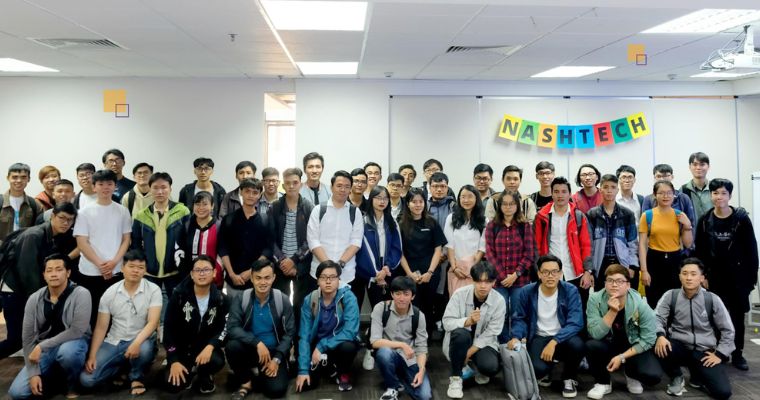
TMA Solutions
TMA Solutions started in 1997 and stands out as a premier software outsourcing company in Vietnam with 28 years of experience. The firm employs 4,000 engineers and serves clients in 30 countries so you can rely on their massive scale and global reach. TMA Solutions holds international certifications like CMMi Level 5 and ISO 27001:2022 because they prioritize quality standards for every engagement. Their workforce includes hundreds of developers specializing in Java and Big Data to ensure your agile software outsourcing needs are met.
Key software development outsourcing services from TMA Solutions:
- Research and Development
- MVP Development
- Maintenance and Support for Existing Products
- PoC and Prototype Development
- Products Enhancement
- Porting and Migration
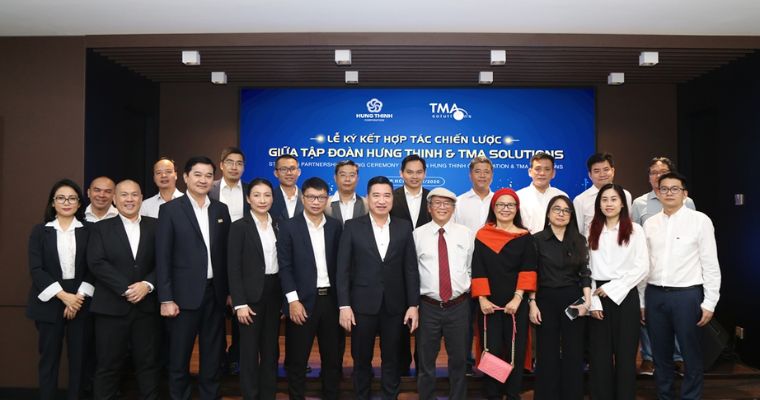
FPT Software
FPT Software is the largest software company in Vietnam and maintains a global presence with offices in 26 countries. The company employs over 33,000 staff members who achieve 100% AI proficiency so you can leverage cutting-edge technology for your projects. Their team delivers results with a fulfillment time of just 25 days because they prioritize efficiency and innovation. You can rely on their quality since they received recognition in the Gartner Market Guide and the Everest PEAK Matrix Assessment for digital transformation services.
Key software development outsourcing services from FPT Software:
- Assessment & Solution Design
- Legacy Migration
- Legacy Modernization
- Mainframe Maintenance
- Verification & Testing
- Managed Services
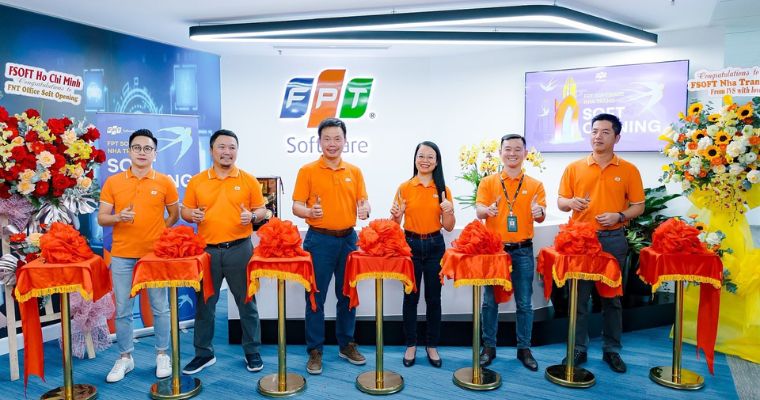
CMC Global
CMC Global operates as a top digital transformation provider and has served the market since 1993 to help businesses succeed. The company employs over 3,000 certified engineers who assist clients of all sizes across 30 countries because they prioritize speed and customer centricity. You can access a one-stop solution for tech enablement and AI-driven innovation since they bring 32 years of experience to every project. Their team supports 300 global clients and 35 business partners so you benefit from their unwavering commitment to creativity.
Key software development outsourcing services from CMC Global:
- Custom Software Development
- Software Maintenance
- Application Managed Service
- Legacy Migration
- Testing Services
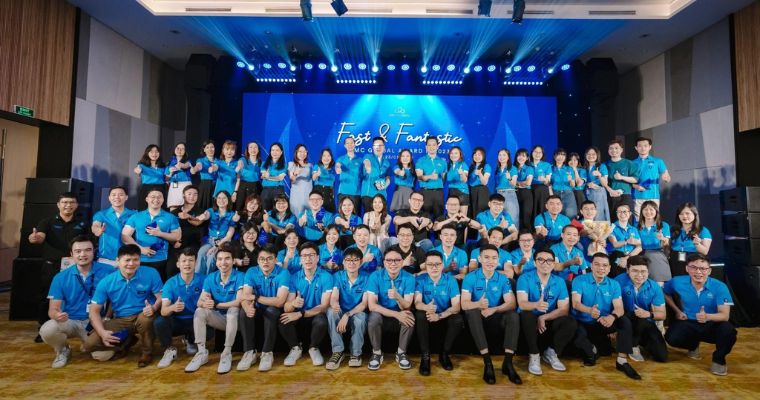
How to choose the right outsourcing partner in Vietnam
Selecting the ideal software outsourcing partner in Vietnam requires comprehensively evaluating various factors. Let’s explore five key aspects to consider when making this crucial decision.
Evaluation criteria for outsourcing companies
You must evaluate critical factors like industry experience, stability, and technological expertise when assessing software outsourcing partners in Vietnam. These criteria ensure the company aligns with your goals because robust development methodologies and communication capabilities guarantee efficient execution. A reliable partner should excel in at least 70% of these areas and possess certifications like ISO 9001 or CMMI so you can verify their commitment to high standards.
Significance of industry experience
Industry-specific experience plays a crucial role because partners with deep sector knowledge better understand your unique challenges and regulatory requirements. Experts provide targeted solutions when they already know HIPAA compliance for healthcare or complex payment integrations for fintech. Vietnamese outsourcing companies frequently excel in e-commerce, fintech, healthcare, and logistics so they possess the necessary portfolios to handle your project efficiently.
Key questions for potential partners
When evaluating potential outsourcing partners in Vietnam, asking the right questions can provide valuable insights into their capabilities and working style. Here are seven crucial questions to consider:
- What is your experience in our specific industry, and can you provide case studies of similar projects?
- How do you ensure effective communication and manage potential language or cultural barriers?
- What is your typical project management approach, and how do you handle changes in project scope?
- How do you protect intellectual property and ensure data security?
- What is your quality assurance process, and how do you handle bug fixes and maintenance?
- How do you manage resource allocation and team scalability for projects?
- What technologies and tools does your team specialize in, and how do you stay updated with industry trends?
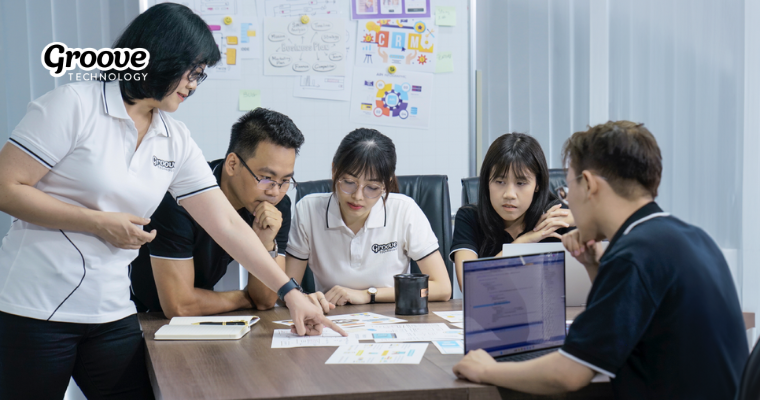
Assessing developer technical skills
Evaluating the technical skills of developers in Vietnamese software outsourcing agencies is crucial for ensuring project success. There are five effective methods to assess these skills:
- Technical interviews: Conduct in-depth interviews focusing on problem-solving abilities, algorithmic thinking, and specific technology expertise.
- Coding tests: Utilize platforms like HackerRank or Codility to assess coding proficiency in relevant programming languages.
- Portfolio review: Examine past projects and contributions to open-source repositories to gauge real-world experience.
- Pair programming sessions: Engage in collaborative coding exercises to evaluate problem-solving approaches and coding practices.
- Technical certifications: Look for relevant certifications in specific technologies or methodologies.
For example, a company might use a combination of these methods, such as a HackerRank test focusing on algorithmic skills, followed by a system design interview for senior roles. Additionally, they might request a code review of a small project to assess code quality and documentation practices.
Impact of company culture on partnership
Company culture plays a significant role in the success of outsourcing partnerships, especially when working with Vietnamese companies. A strong cultural fit can lead to better communication, increased productivity, and a more harmonious working relationship.
When outsourcing to Vietnam, consider these five cultural aspects:
- Communication style: Vietnamese culture often emphasizes indirect communication. Understanding this can help interpret feedback and manage expectations.
- Hierarchy and respect: There’s often a strong respect for authority and seniority. This can impact decision-making processes and team dynamics.
- Work ethic: Vietnamese professionals are known for their strong work ethic and dedication, which can be a significant asset to projects.
- Flexibility: Many Vietnamese companies demonstrate adaptability in working hours to accommodate international clients.
- Relationship-building: Building personal relationships is often valued in Vietnamese business culture, which can lead to stronger, long-term partnerships.
Frequently asked questions about software development outsourcing companies in Vietnam
Is Vietnam a good alternative to India for software outsourcing?
Yes, Vietnam is increasingly seen as a strong alternative to India. While India has a larger IT workforce, Vietnam offers competitive advantages such as strong government support for the IT sector and a growing pool of young, skilled developers. According to the Tholons Services Globalization Index, Ho Chi Minh City is 54th, and Hanoi is 71st.
How does the quality of Vietnamese developers compare to those in Eastern Europe?
Vietnamese developers are generally considered to be on par with their Eastern European counterparts regarding technical skills. However, Vietnam often offers more competitive pricing. The SkillValue Report 2019 ranked Vietnam 29th globally regarding developer skills, close to several Eastern European countries.
Can Vietnamese outsourcing companies handle projects for highly regulated industries?
Many Vietnamese outsourcing companies have experience working with highly regulated industries such as finance and healthcare. They know international standards and regulations like GDPR, HIPAA, and PCI-DSS. However, verifying a company’s specific experience and certifications in your industry is crucial.
How does Vietnam compare to other Southeast Asian countries regarding software outsourcing?
Vietnam is often considered a leading software outsourcing destination in Southeast Asia. Compared to countries like the Philippines or Malaysia, Vietnam often offers a larger pool of IT talent and more competitive rates. The AT Kearney Global Services Location Index 2019 ranked Vietnam 5th in Asia for outsourcing attractiveness.
Sum up
Vietnam’s software outsourcing industry offers a compelling blend of technical expertise, cost-effectiveness, and a supportive business environment. By understanding the landscape, carefully evaluating potential partners, and implementing best practices, businesses can leverage Vietnam’s IT talent to drive their digital initiatives forward.
Remember, successful outsourcing is finding the lowest cost and building a partnership that adds value to your business. Whether you’re a startup looking for agile development support or an enterprise seeking digital transformation expertise, Vietnam’s top software outsourcing companies are well-equipped to meet your needs.
As you embark on your outsourcing journey, consider contacting some of the companies mentioned in this guide. With its commitment to simplifying the outsourcing process and high client retention rate, Groove Technology could be an excellent starting point for your exploration of Vietnam’s software outsourcing capabilities.





